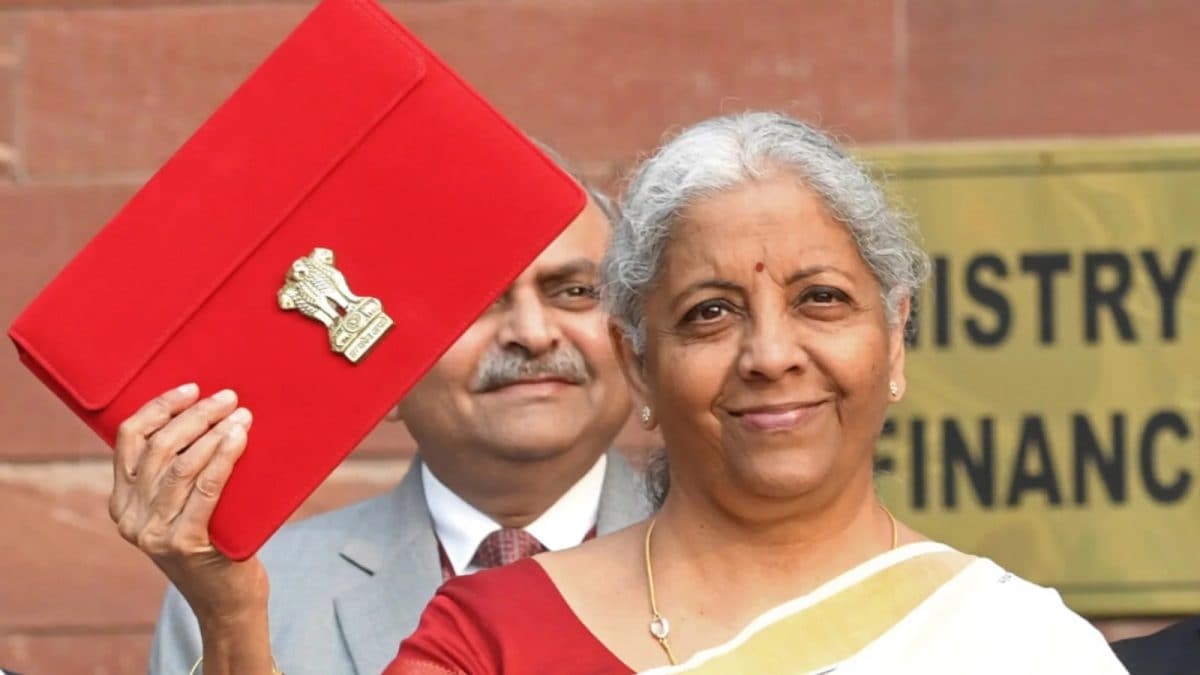Business
Lenskart IPO Receives 1.13x On Day 1: Should You Apply? Check GMP, Price, Recommendations

Last Updated:
Lenskart IPO News: On Day 1, the IPO receives a 1.13x subscription. Its retail category receives a 1.32x subscription, while the NII quota gets 0.41x subscription.

Lenskart IPO GMP Today.
Lenskart IPO GMP Today, Lenskart IPO News: Eyewear retailer Lenskart Solutions opened its initial public offer (IPO) today, Friday, October 31. The price band of the Rs 7,278-crore IPO has been fixed in the range of Rs 382-Rs 402 apiece. On the first day of the IPO, its GMP has increased to 18.41% despite high valuation concerns.
On the first day of bidding on Friday, the IPO has been fully subscribed and has received a 1.13x subscription, garnering bids for 11,25,11,487 shares as against the 9,97,42,748 shares on offer. Its retail category has received a 1.32x subscription, while the NII (non-institutional investor) quota has received a 0.41x subscription. The QIB category received a 1.42x subscription.
A day before the IPO, Lenskart Solutions on Thursday garnered a blockbuster response from anchor investors, receiving bids of around Rs 68,000 crore. This is nearly 10 times the issue size of Rs 7,278 crore, and 20 times the anchor book size of more than Rs 3,200 crore.
Lenskart IPO: Opening, Closing, Allotment, Listing Dates
The IPO will be opened on October 31 and closed on November 4. Its allotment will be finalised on November 6, while the stock listing is scheduled to take place on November 10 on both BSE and NSE.
Lenskart IPO GMP Today
According to market observers, unlisted shares of Lenskart Solutions Ltd are currently trading at Rs 476 apiece in the grey market, a GMP of Rs 74 over the upper IPO price of Rs 402. It means a grey market premium (GMP) of 18.41%, indicating decent listing gains for investors.
The GMP is based on market sentiments and keeps changing. ‘Grey market premium’ indicates investors’ readiness to pay more than the issue price.
Lenskart IPO: Brokerage Recommendations
Analysts point towards the high valuation of the company. SBI Securities said that at the upper end of the price band, Lenskart’s valuation stands at 10.1 times its FY25 EV/Sales and 68.7 times EV/EBITDA on a post-issue basis. The IPO comes at a price-to-earnings (P/E) ratio of 230x.
The analysts at SBI Securities cautioned that the issue appears stretched on valuation, which may cap potential listing gains. However, they highlighted the company’s strong business model and the significant growth opportunity in India’s expanding eyewear market as key positives.
The brokerage also noted that profitability metrics will need close monitoring as the company continues to scale its operations. Lenskart’s EBITDA margin has notably improved from 7% in FY23 to 14.7% in FY25, reflecting operational efficiency. Considering the company’s long-term prospects, SBI Securities has recommended subscribing to the IPO for the long term at the cut-off price.
Brokerage firm SIMFS recommends subscribing to the IPO, highlighting the strong growth runway in India’s eyewear market and Lenskart’s tech-enabled business model. It pointed to the company’s “vertically integrated manufacturing ecosystem” and profitability turnaround.
The firm noted that India’s eyewear industry is “poised for exceptional growth… projected to reach Rs 1,483 billion by FY30, clocking a 13% CAGR.” It emphasised Lenskart’s scale advantages, saying the firm produces “30-40 million lenses and 25 million frames annually… eliminating 2.5-4x middlemen markups, enabling 70% gross margins.”
SIMFS recommended that the IPO is a “high-risk, high-potential opportunity” given long-term growth tailwinds and Lenskart’s execution track record.
Choice Broking emphasised the expensive valuation, noting that “at the upper end of its price band, LSL is valued at an EV/Sales of 9.9× (TTM basis), which appears significantly high.” While acknowledging Lenskart’s steady revenue growth and improving store economics, it highlighted that “profitability remains weak, with a positive PAT mainly driven by other income and lower expenses.”
Choice Broking observed that around 40% of revenue now comes from international markets and referenced marquee investor interest, noting Radhakishan Damani’s Rs 90-crore pre-IPO investment.
Given growth prospects but high valuation, the brokerage said the issue “is best suited for investors with a higher risk appetite and a long-term investment horizon,” assigning a ‘Subscribe for Long Term’ rating.
Nirmal Bang highlighted Lenskart’s omnichannel strategy, centralised manufacturing, and technology leverage as core strengths, saying these enable the company “to remain cost competitive in the highly fragmented market” and “scale faster than the industry.”
The brokerage noted strong financial momentum — revenues and EBITDA grew at a CAGR of 32.5% and 92.3% over FY23–25 — and said the company has “become PAT positive in FY25.” However, it flagged valuations, saying, “At FY25 P/E of 235x and EV/EBITDA of 68x, issue prima facie looks expensive.”
Still, when compared with other listed retailers like Metro and Trent, it said valuations “seem fair,” and future expansion plans “provide cushion.” Nirmal Bang recommended subscribing “with long-term view.”
SBI MF Invests Rs 100 Crore In Lenskart
SBI Optimal Equity Fund (AIF) and SBI Emergent Fund (AIF), invested Rs 100 crore in eyewear retailer Lenskart Solutions Limited through a pre-IPO transaction at a transfer price of Rs 402 per equity share.
Last week, Billionaire investor Radhakishan Damani, founder of Avenue Supermarts (DMart), invested around Rs 90 crore in eyewear retailer Lenskart through a pre-IPO transaction.
Lenskart IPO Price Band and Size
The company has fixed the price band at Rs 382-402 per share for its IPO. At the upper end of the price band, Lenskart is seeking a valuation of around $7.91 billion (about Rs 72,700 crore).
The issue includes a fresh issue of shares worth Rs 2,150 crore, while the offer-for-sale (OFS) segment will see promoters and investors offloading more than 12.75 crore equity shares.
Key Selling Shareholders in the OFS
Along with founders and promoters (Peyush Bansal, Neha Bansal, Amit Chaudhary, and Sumeet Kapahi), several major investors are participating in the OFS. These include SoftBank’s SVF II Lightbulb (Cayman), Schroders Capital, PI Opportunities Fund, MacRitchie Investments, Kedaara Capital Fund, and Alpha Wave Ventures.
Notably, Schroders Capital Private Equity Asia (Mauritius) is set to make a complete exit, selling 1.9 crore shares, which represent a 1.13% stake in the company.
About Lenskart
Founded in 2010, Lenskart began as an online eyewear retailer and has since grown into one of India’s leading omnichannel eyewear brands with both online and offline presence. The company was valued at $6.1 billion as of September 2025, according to Tracxn data cited by Reuters.
In June 2025, the company transitioned into a public limited entity — changing its name from Lenskart Solutions Private Limited to Lenskart Solutions Limited after an extraordinary general meeting held on May 30.
Lenskart IPO Lead Managers and Objective
The fresh issue will be used for business expansion, new investments, acquisitions and general corporate purposes.
The IPO will be managed by a consortium of top investment bankers, while the registrar and book-running lead managers will be responsible for allotment and investor coordination.
With strong brand visibility, a robust online-offline model, and solid investor backing, the Lenskart IPO is expected to generate significant interest among both retail and institutional investors.

Haris is Deputy News Editor (Business) at news18.com. He writes on various issues related to personal finance, markets, economy and companies. Having over a decade of experience in financial journalism, Haris h…Read More
Haris is Deputy News Editor (Business) at news18.com. He writes on various issues related to personal finance, markets, economy and companies. Having over a decade of experience in financial journalism, Haris h… Read More
October 31, 2025, 09:33 IST
Read More
Business
Harry Styles and Anthony Joshua among UK’s top tax payers

The former One Direction member-turned-solo artist appears on the Sunday Times list for the first time.
Source link
Business
From Manufacturing To Infra And AI: Capex Boost Flags Off Budget 2026 ‘Reforms Express’

Last Updated:
Budget 2026: FM Nirmala Sitharaman gives a strong push to manufacturing, infrastructure and job creation, while proposing a simpler tax and customs system.

Finance Minister Nirmala Sitharaman presents the Union Budget 2026-27.
Budget 2026 Takeaways: Finance Minister Nirmala Sitharaman on Sunday presented the Union Budget 2026-27, giving a strong push to manufacturing, infrastructure and job creation, proposing a simpler tax and customs regime, and hailing the government’s modernisation drive as a “reforms express”.
The Budget 2026 is anchored around three ‘kartavyas’ — driving growth by enhancing productivity and competitiveness, building people’s capacity, and ensuring inclusive development under the vision of Sabka Saath, Sabka Vikaas.
In her ninth consecutive Budget in Parliament, Sitharaman laid out a multi-pronged strategy to sustain growth amid global uncertainty, including expanding domestic electronics and semiconductor capabilities, de-risking infrastructure projects, skilling India’s youth for emerging technologies, and easing compliance for taxpayers and importers.
Here are the key takeaways from Budget 2026 across manufacturing, infrastructure, skills, AI, taxation and customs duty.
Manufacturing Gets A Boost
Budget 2026 put a special emphasis on the manufacturing landscape in India. The outlay for electronics components manufacturing was raised sharply to Rs 40,000 crore, while new schemes for rare earth magnets, chemical parks, container manufacturing and capital goods seek to reduce import dependency, and strengthen domestic supply chains. Textiles got an integrated, employment-oriented package covering fibres, clusters, skilling and sustainability.
Infrastructure-Led Growth
Infrastructure got a boost with a higher capex allocation and initiatives like a risk guarantee fund to de-risk projects for private developers, new dedicated freight corridors and national waterways, dedicated REITs (real estate investment trusts) for recycling of significant real estate assets of central public sector enterprises (CPSEs), and a seaplane VGF (viability gap funding) scheme.
The Centre’s capital expenditure (capex) target has been increased to Rs 12.2 lakh crore for FY27, up from Rs 11.2 lakh crore earmarked for the current financial year. Moreover, maintaining the fiscal discipline, Sitharaman said the government expects the fiscal deficit to be at 4.3 per cent of the GDP in 2026-27, lower than 4.4 per cent projected for the current financial year.
Tier-II and Tier-III cities were placed at the centre of urban growth via City Economic Regions, backed by reform-linked funding.
“We shall continue to focus on developing infrastructure in cities with over 5 lakh population (Tier II and Tier III), which have expanded to become growth centres,” Sitharaman said in her Budget Speech.
Greater Emphasis On Skilling
The Budget placed renewed emphasis on the services economy as a jobs engine. A high-powered Education-to-Employment and Enterprise Committee will realign skilling with market needs, including the impact of emerging technologies.
Content creation and creative industries get a boost through AVGC labs in schools and colleges, support for animation, gaming and comics, and new institutional capacity for design and hospitality. Tourism-linked skilling, from guides to digital heritage documentation, signals a clear intent to convert culture and content into employment and exports.
“I propose to support the Indian Institute of Creative Technologies, Mumbai in setting up AVGC Content Creator Labs in 15,000 secondary schools and 500 colleges,” FM Sitharaman said. AVGC stands for animation, visual effects, gaming and comics.
AI & Semiconductors Push
Artificial intelligence (AI) was positioned as a cross-sector force multiplier rather than a standalone theme. The Budget provided a push to artificial intelligence (AI) by promoting adoption with governance, agriculture, education and skilling, including proposals for AI-enabled advisory tools for farmers and AI integration in education curricula.
On hardware, the semiconductor strategy expanded decisively under ISM 2.0 (India Semiconductor Mission 2.0), with focus on domestic equipment manufacturing, materials, research centres and workforce development, signalling a long-term commitment to building a resilient chip ecosystem in India.
Taxation, ITR, TDS, TCS
A major structural reform comes with the Income Tax Act, 2025, effective April 1, 2026, containing simpler rules and redesigned forms.
Budget 2026 provided compliance relief for individuals, including extended timelines for revising returns to March 31 from December 31 earlier, staggered ITR due dates, and easier filing of Form 15G/15H through depositories.
Individuals with ITR-1 and ITR-2 returns will continue to file till July 31, and non-audit business cases or trusts are proposed to be allowed time till August 31, according to the Budget Speech 2026-27.
“I propose to extend time available for revising returns from 31st December to up to 31st March with the payment of a nominal fee. I also propose to stagger the timeline for filing of tax returns. Individuals with ITR 1 and ITR 2 returns will continue to file till 31st July and non-audit business cases or trusts are proposed to be allowed time till 31st August,” Sitharaman said.
TDS (Tax deducted at source) rules were clarified for manpower services, while a rule-based system for lower or nil TDS certificates is proposed. TCS rates were cut to 2% for overseas tour packages, education and medical expenses under liberalised remittance scheme (LRS). Litigation is targeted through integrated assessment and penalty orders, lower pre-deposit requirements, and wider immunity provisions.
TDS on the sale of immovable property by a non-resident will be deducted and deposited through resident buyer’s PAN (Permanent Account Number)-based challan instead of requiring TAN (Tax Deduction and Collection Account Number), Sitharaman said.
Customs Duty Tweaks
Customs duty rationalisation continued with a clear focus on domestic manufacturing, energy transition and ease of living. Exemptions have been extended or introduced for capital goods used in lithium-ion batteries, critical minerals processing, nuclear power projects and aircraft manufacturing.
Personal imports will become cheaper with a reduction in duty on goods for personal use from 20% to 10%. Seventeen cancer drugs and additional rare-disease treatments were exempted from customs duty. Process reforms aimed at trust-based, tech-driven clearances, faster cargo movement and lower compliance costs, especially for exporters and MSMEs (micro, small, medium and enterprises).
STT On F&O Hiked
The Budget increased securities transaction tax (STT) on futures trading from 0.02% to 0.05% and on options trading from 0.10% to 0.15%, a move that upset the capital markets with the BSE Sensex crashing more than 2,300 points from the day’s high and the NSE Nifty dropping to 24,571.75.
Securities Transaction Tax (STT) is a direct tax imposed on the buying and selling of securities in India.
Commenting on the Budget, Prime Minister Narendra Modi said, “The Union Budget reflects the aspirations of 140 crore Indians. It strengthens the reform journey and charts a clear roadmap for Viksit Bharat.”
February 01, 2026, 14:43 IST
Read More
Business
Air India resumes direct Shanghai-New Delhi flights after nearly six years

Shanghai (China): The Consulate General of India in Shanghai welcomed the resumption of Air India’s direct flight services between Shanghai and New Delhi, marking a major step forward in restoring people-to-people, business and institutional connectivity between India and China.
According to an official release, the inaugural Shanghai-New Delhi flight departed today from Shanghai Pudong International Airport, carrying over 230 passengers on board the Boeing 787 aircraft. The relaunch comes after a gap of nearly six years and represents a significant milestone in normalising bilateral air connectivity following the suspension of services in early 2020.
Speaking on the occasion, Consul General Pratik Mathur said, “The resumption of direct flights between Shanghai and New Delhi is a tangible expression of the renewed momentum in India-China engagement. Enhanced air connectivity is essential for facilitating trade, tourism, academic exchanges and people-to-people contacts, particularly between India and East China. We are pleased to see Air India restoring this important link.”
As per a release, Air India will operate the route four times a week using its Boeing 787-8 Dreamliner aircraft, featuring modernised cabins and enhanced onboard services. The restored service reflects the growing demand for travel between the two countries and the steady recovery of cross-border mobility. It will also support commercial, educational and cultural exchanges between India and the Yangtze River Delta region, one of China’s most economically dynamic clusters.
The Consulate General of India in Shanghai remains committed to supporting initiatives that strengthen connectivity and deepen cooperation across trade, investment, tourism, education and cultural exchange, the release stated.
-

 Sports5 days ago
Sports5 days agoPSL 11: Local players’ category renewals unveiled ahead of auction
-

 Entertainment1 week ago
Entertainment1 week agoThree dead after suicide blast targets peace committee leader’s home in DI Khan
-

 Tech1 week ago
Tech1 week agoThis Mega Snowstorm Will Be a Test for the US Supply Chain
-

 Entertainment5 days ago
Entertainment5 days agoClaire Danes reveals how she reacted to pregnancy at 44
-

 Fashion1 week ago
Fashion1 week agoSpain’s apparel imports up 7.10% in Jan-Oct as sourcing realigns
-

 Tech1 week ago
Tech1 week ago‘Uncanny Valley’: Donald Trump’s Davos Drama, AI Midterms, and ChatGPT’s Last Resort
-

 Tech1 week ago
Tech1 week agoICE Asks Companies About ‘Ad Tech and Big Data’ Tools It Could Use in Investigations
-

 Sports5 days ago
Sports5 days agoCollege football’s top 100 games of the 2025 season







